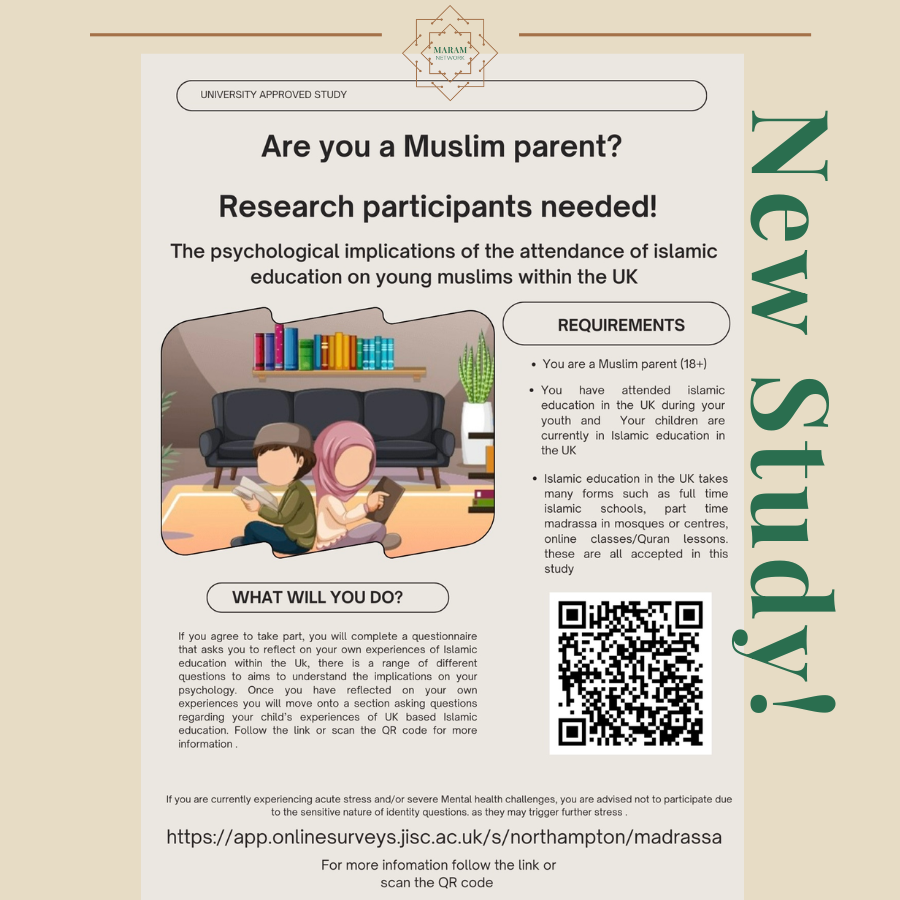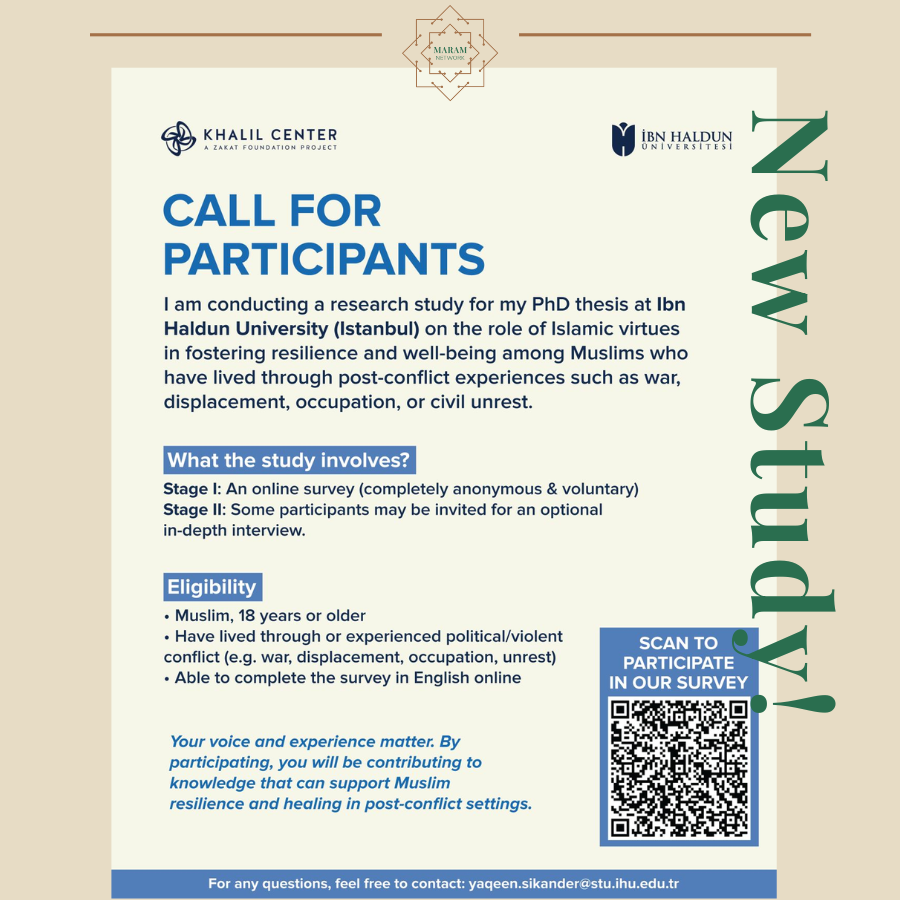
Research
Active Projects
-

The Ultimate Secure Base: Understanding Attachment to God in Muslim Americans
This qualitative study examines how Muslim American adults experience and understand their relationship with God, with a focus on attachment to God as a source of safety, support, and meaning. It explores how early caregiver relationships, psychotherapy, and broader relational and cultural contexts shape experiences of closeness to God over time.
-

Exploring preeclampsia knowledge and self-monitoring practices among Black Muslim and Middle Eastern/North African women
The purpose of this study is to understand what Middle Eastern North/African Black Muslim women know about preeclampsia and how they feel about taking their own blood pressure at home in addition to opinions about their experiences with their healthcare providers.
-

Exploring South Asian Muslim Mental Health and Well-being
The purpose of this research is to look at mental health within South Asian Muslims using multiple items. Participants will be filling out demographics and 7 different item measures including: identity, belonging, emotion regulation, discrimination, and acculturation affect well-being of South Asian Muslim adults. The goal of this study is explore the current state of South Asian Muslim's well-being and mental health to inform future community outreach attempts and intervention planning.
-

The Psychological Implications of the attendance of Islamic Education on young Muslims within the United Kingdom
The purpose of the study is to understand the psychological implications that attending Islamic education in the United Kingdom has on youth based on individuals experiences and reflections on their child’s experiences. The goals are to build a strong case around Islamic Education and to increase attendance and understanding of the benefits particularly in a western environment.
-

Belonging, Identity, and Wellbeing Among Muslim Emerging Adults in Canada
We're conducting a psychology undergraduate research project exploring how identity centrality, religiosity, and sense of community relate to wellbeing among Muslim emerging adults (ages 18-30). To participate, you must self-identify as Muslim, be between the ages 18-30, and live in Canada.
-

Muslim Experiences of Loneliness and Social Connectedness: The Role of Religious and Ethnic Identity
This study aims to examine the experiences of loneliness and social connectedness across different contexts among Muslims in the U.S. as it relates to religious and ethnic identities. Approximately 150 Muslim adults (i.e.,18 y.o. or above) residing in the U.S. will be asked to participate in this study. The purpose of this study is examine the experiences of loneliness and social connectedness among Muslims in the U.S. as it pertains to religious and ethnic identities.
-

Examining Variation in Arabic Heritage Langauge Competence
This study investigates the acquisition of Arabic as a heritage language. It basically focuses on how bilingual speakers of both Arabic and English (especially those who speak English predominantly) use their Arabic language. The study compares two heritage groups (Egyptians and Syrians), so I am looking for participants who were born or raised in the United States to at least one Egyptian or Syrian parent. Those Arabic speakers with lower proficiency levels are highly encouraged to participate as they are the main focus group..
-

Cultural Beliefs, Internalized Stigma, and Immigration Status as Predictors of Willingness to Seek Help for Postpartum Mental Health Disorders Among South Asian Muslim Women in the United States
We are conducting an anonymous online survey about how cultural beliefs, internalized stigma, and immigration status (immigrant vs. US born) impact willingness to seek help for postpartum mental health among South Asian Muslim women in the United States. You may participate if you are 18-45, have given birth in the last 12 months, are at least 6 weeks postpartum, and live in the United States. The survey takes about 20-25 minutes, is anonymous, and you may skip any question or stop at any time.
-

An Analysis of Islamic Virtues in Fostering Post-Conflict Resilience and Well-being Among Muslim Populations
This study explores how Islamic virtues such as sabr (patience), tawakkul (trust in God), shukr (gratitude), and rahmah (compassion) foster resilience and well-being among Muslims recovering from conflict. It examines how faith-based values help individuals and communities cope with psychological, social, and economic challenges after war or displacement. By highlighting the connection between religion and psychology, the study emphasizes the importance of integrating Islamic virtues into mental health and recovery programs. Its findings aim to inform policymakers, religious leaders, and practitioners seeking culturally grounded approaches to post-conflict healing and community cohesion.
-

Developing a Community-Informed, Culturally-Tailored Violence Prevention Screening Tool: Pilot Test From the Victim’s Perspective
Intimate Partner Violence (IPV) is a prevalent public health issue that affects at least 1 in 3 women worldwide, with minority populations being at a higher risk for experiencing IPV. Currently, Arabs in the U.S. are considered White under the Census Bureau, making them an unidentified minority group. Given the many factors that place this population at risk for IPV, screening methods are crucial for promoting early intervention against future abuse. The purpose of this project is to pilot test a new violence prevention screening tool to include the perspectives of Arab American victims of IPV.
-

Hidden in Plain Sight: Exploring Hijab Practices and Hair Health Awareness Among Muslim Women
Despite the clinical significance of hijab-related dermatoses, cultural and religious considerations often present barriers to care, restricting Muslim women from accessing the critical care to address concerns regarding their hair health. Findings suggest that in addition to improved physician cultural humility, there is a need for culturally tailored outreach to build trust and improve literacy and awareness about scalp health. By collecting data to better understand needs, awareness and access gaps, physicians will be better equipped to build trust with the Muslim community, provide culturally sensitive scalp/hair screenings and improve outcomes for this underserved population. The purpose of this study is to evaluate the hijab practices, hair health awareness and attitudes toward hijab among hijab-wearing individuals.
-

National Survey of American Islamic School Alumni
This study is the first national survey of Islamic school alumni to explore the long-term impacts of attending full-time Islamic schools. Your voice and experiences can help guide school improvement, reform, and community growth.
-

Understanding Suicide Prevention Competencies Among Muslim Faith Leaders in Canada
This study exploring the suicide prevention competencies of Muslim faith leaders in Canada, including clergy, Imams, chaplains, and seminary students. The purpose of this study is to better understand the training, practices, and support needs of Muslim religious leaders in relation to suicide prevention, intervention, and postvention in their communities.
-

Behavioral Health Impacts of Informal Caregiving on Adults in the United States who are Caring for their Aging Parents
The purpose of this study is to explore the mental health impacts of informal caregiving among South Asian and Middle Eastern adults in the United States who provide care for their aging, immigrant parents or in-laws. Informal caregiving, while often framed as an act of love and cultural responsibility, is associated with significant stress, anxiety, and psychological burden. At the same time, cultural protective factors—such as religious coping, family loyalty, and community support—may buffer against negative mental health outcomes.
-

Gaza and American Conversion to Islam
Since October 2023, reports of Westerners embracing Islam have grown. Many link this shift to the livestreamed Gaza genocide and the Islamically rooted resilience of the Gazan people. Digital da‘wa efforts have also grown, giving non-Muslims direct access to Islam as told by Muslims themselves. This study examines the relationship between the war in Gaza, the rise of Muslim voices on Islam, and the reported increased conversions in the US.
-

Infertility and Faith: Muslim Women's Experiences, Religiosity, & Ethical Decision-Making on Assisted Reproductive Technology in Southern California
The aim of this study is to understand the intersection of infertility and faith better and explore how faith/religiosity shapes perceptions of this journey. The study also examines how faith/religion influence ethical decision-making related to assisted reproductive technologies (ART).
-

Education Research Expert Needed
Seeking a researcher with a strong background in publishing in the field of special education or education in general.
Request: Peer-review articles before submission to minimize rejections
Does not need to specialize in the Muslim community
-

Muslim Parenting Survey
Calling all Muslim parents or primary caretakers of children ages 0-18 to take part in a 20-minute survey for a new study on Muslim parenting and how families approach raising children within an Islamic framework.
-

Mental Health Stigma and Its Associations with Depression, Suicidality, and Help-Seeking Among Muslims Living in the United States
The current study aims to recruit Muslims living in the United States with depression to examine their experiences around mental health issues and help-seeking. The present study will help to improve the understanding of mental health-related experiences among Muslims living in the United States.
